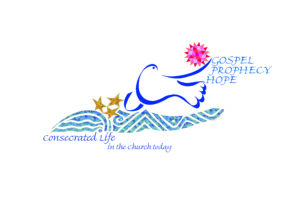“Where there are religious, there is joy,” says Pope Francis in his letter beginning the Year of Consecrated Life. And while he is addressing members of Consecrated Life, his message is for all of us – where there are Christians, there is joy! “We are called to know  and show that God is able to fill our hearts to the brim with happiness; that we need not seek our happiness elsewhere …” (II.1) What a challenge! And yet, this is not new! In the first letter of Peter, he tells us to always be ready to account for the hope that is within us (see 1 Pt 3:15), and in the Acts of the Apostles, Luke speaks of how we are impelled to reveal the source of our joy, “for we cannot keep from speaking about what we have seen and heard.” (Acts 4:20)
and show that God is able to fill our hearts to the brim with happiness; that we need not seek our happiness elsewhere …” (II.1) What a challenge! And yet, this is not new! In the first letter of Peter, he tells us to always be ready to account for the hope that is within us (see 1 Pt 3:15), and in the Acts of the Apostles, Luke speaks of how we are impelled to reveal the source of our joy, “for we cannot keep from speaking about what we have seen and heard.” (Acts 4:20)
This is not to deny the trials and difficulties of daily life, “But in all these things we should be able to discover ‘perfect joy,’” says Pope Francis. He continues, “In a society which exalts the cult of efficiency, fitness and success, one which ignores the poor and dismisses ‘losers,’ we can witness by our lives to the truth of the words of Scripture: “When I am weak, then I am strong.” (2 Co 12:10)” (II. 1)
Contrary to what we hear day-in-and-day-out, efficiency and success are not our goals; a life of joy inspired by the Gospel and the following Jesus Christ which then radiates and inspires others to experience that same joy, peace, and love for God and one another, this is our goal and one that can clearly change the world, “wake up the world” (II.2) one person at a time, beginning with ourselves.
Success, at least how we are led to believe it is in our current society, is a form of ‘winning,’ at the cost of someone else ‘losing’ or not succeeding as well. We define success by comparisons to others – I am better off than this one but not as well off as someone else; only when I have bested everyone else can I say I am successful. This was also true in the time of Jesus and he turned this belief upside down: “all who exalt themselves will be humbled, but all who humble themselves will be exalted.” (Lk 18:13)
Jesus presents success as humility and hospitality (see Lk 14:7-14), simplicity and dispossession (see Mt 19:13-15 and 16-30), generosity (see Mt 20:1-16), and ultimately the recognition of the communion of the human family as the measure by which we will be judged (see Mt 25:31-46). “Radical evangelical living is not only for religious: it is demanded of everyone,” Francis reminds us. (II.2) In this, he calls us to be “experts in communion,” (II.3) this communion which calls us out of ourselves to seek the good, the best, for our sisters and brothers.
“The path of charity open before us is almost infinite … No one contributes to the future in isolation, by his or her efforts alone, but by seeing himself or herself as part of a true communion which is constantly open to encounter, dialogue, attentive listening and mutual assistance. Such a communion inoculates us from the disease of self-absorption.” (II.3) Pope Francis continues, “don’t remain a hostage to your own problems. These will be resolved if you go forth and help others to resolve their own problems, and proclaim the Good News. You will find life by giving life, hope by giving hope, love by giving love.” (II.4)
 This advice is so simple. So clear. So true. Yet so utterly challenging and radical it shakes the ground under our feet and cries: “WAKE UP!” Let us be awake and answer the challenge to wake up the world!
This advice is so simple. So clear. So true. Yet so utterly challenging and radical it shakes the ground under our feet and cries: “WAKE UP!” Let us be awake and answer the challenge to wake up the world!
Sr. Kelly Connors, pm teaches Canon Law for Saint Joseph’s College Online.


